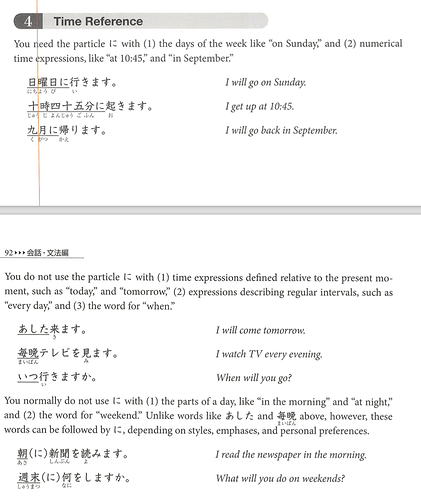I would generally say: concrete point in time use に and otherwise don’t.
Weekdays are optional
Aye. The rule of thumb I was taught was if the date can be expressed as a number, you use に. Weekdays can be expressed as a number (the first day of the week, the second day and so forth).
According to Genki 1, it’s incorrect to use に with things that happen at a regular interval, like 毎(anything), and two other cases. Here’s the source:
Does potential stem + そうだ/そうです have a special meaning? I was talking to someone about a concert I went to with two friends a long time ago in high school. Then he asked:
その彼女とこれからいっしょにコンサートに行けそうですか。
I asked him what it meant and he explained it as 行ける + かもしれない, so my guess is “might be able to go,” but in the context of the sentence, I don’t understand because it happened a long time ago so there’s no “might” anymore.
He also gave me more examples to show me how it’s formed:
食べれそう
飲めそう
弾けそう
読めそう
Am I right that it means “may be able to ___?” If so, how does that fit into the sentence about the concert?
I don’t see why it requires any special framing.
“Did it seem like she’d be able to go?”
The only thing to clear up is if the past tense is unnecessary because you had already established it was in the past, or if your friend didn’t understand it was in the past. But it seems to me that’s the actual question, not the 行けそう, because it works fine as just “seems like” and “able to go”.
Correct me if I’m wrong, but I’m assuming you already know そうだ in other contexts.
Ah, ok. Maybe it was a misunderstanding then. Thanks for the reply!
Is there a grammar rule that can transform verbs into a しい form?
I’ve noticed it somewhat with words like 嘆く, 嘆かわしい and similar like words and it has been dawning on me for some time.
I’ve never heard of there being a rule, though it’s possible that it’s simply not regarded that way. I think it’s less the verb being transformed into an adjective and more that there’s a verb and an adjective which both sprang from the same etymological root. Patterns rather than rules of transforming.
You’ll often find that しい adjectives can perform as verbs by switching the い for a む, or a noun by adding a み instead. For example:
楽しい → 楽しむ → 楽しみ
悲しい → 悲しむ → 悲しみ
苦しい → 苦しむ → 苦しみ
And so forth.
There are definitely lots of adjectives that feel like they’ve been converted from verbs.
望む > 望ましい
好む > 好ましい
うらやむ > うらやましい
勇む > 勇ましい
悩む > 悩ましい
痛む > 痛ましい
But it’s not like you can just take any verb and apply the same format. But it might give you a clue of what to search for in the dictionary if you want one of these adjectives. Note that some of them have slightly different meanings than you might initially expect, so they need to be double-checked before being used. Also, I have a feeling most of these are on the rarer side, or literary, etc.
Of those, I really only hear うらやましい regularly, and 望ましい occasionally.
Can someone tell me what 連用形 + おった is supposed to mean? e.g. あたえおった, 止めおった etc. Thanks.
Related?
Ok thanks, that does help because it confirms my suspicion that it was 居る. I should have just checked the dictionary first because the answer was right there:
動詞の連用形に付いて,自分の動作を卑下したり,他人の動作をさげすんだりする時に用いる。
Hi, I don’t understand why in this sentence there isn’t a “間” add after the “年” because it’s a duration.
If I cannot get a full-time job, I will go on a trip FOR a year.
就職しなかったら、一年旅行に行きます。
VS
就職しなかったら、一年間旅行に行きます。
My understanding is that 間 is optional for years and days. I tried to find a variety of resources saying this specifically, but only found that many simply didn’t teach about describing time periods over a year. Here is the one resource I that explicitly says that 間 is optional.
Hopefully that helps.
Thanks you ![]()
コウイチは湖の水面に映る美しい山に感動し、ホロリと涙を流した。
A tear rolled down Koichi’s cheek when he saw the beautiful mountains reflected on the surface of the lake.
Can someone please explain how 映る in this sentence is supposed to make sense? I can’t see a relation between it and the other words…
Edit: Under 30 seconds and Leebo is already on it, what incredible speed
It’s a pretty literal translation. The mountains are reflected (映る) on the surface of the water.
Yep. Noun-modifying phrase - 湖の水面に映る is modifying 美しい山. The reflected-in-the-surface-of-the-lake beautiful mountains.
映る modifies the following word, as non masu and te-form verbs tend to do. However, 美しい is an I-adjective, so that can’t be it. Therefore, both 映る and 美しい modify 山.
Also, 湖の水面に映る is technically the modifying phrase FYI.
Solved in under a minute, you guys are incredible, thanks!
